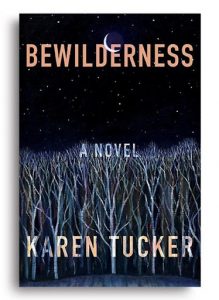by BEE GRAY-ARMY
Bewilderness, Karen Tucker, 2021, 288 p.
In our current moment, addiction is as familiar to most Americans as a regularly scheduled television program. In fact, 22 million people are currently suffering from active substance use disorders and 23 million people are in addiction recovery (according to The Edge Treatment Center). The Edge also posits that 1 in 3 households “suffer from, are exposed to, or are otherwise impacted by addiction.” From music to television, portrayals of addiction are everywhere, shaping our narratives – but also how we live our lives. Already inundated, I was hesitant to read Karen Tucker’s Bewilderness, which focuses on Irene and Luce, best friends and recovering addicts living in (fictional) Anklewood, North Carolina, coping with the sudden death of Irene’s boyfriend Wilky. But, I’m glad I did. Tucker masterfully cultivates empathy for the too-often maligned or misrepresented addict.
Karen Tucker was born and raised in North Carolina. She received her MFA in Creative Writing from Warren Wilson College in 2010 and her Ph.D. in English and Creative Writing from Florida State University in 2020. She is currently teaching at UNC-Chapel Hill. Prior to Bewilderness, Tucker published short stories, including “All Kinds of Lucky” in Boulevard in 2019 and “J.J. FTW” in The Yale Review in 2018. Bewilderness is her debut novel—and it is one that is informed by her personal experiences of loss and grief. In an interview with Clancy McGilligan from the Chicago Review of Books, Tucker says “You ask what inspired this novel, and to that, I would say loss. Had I not learned loss under surprising, painful circumstances, Bewilderness wouldn’t exist––and certainly not in its current shape.” This idea of loss runs deeply through the novel itself, every moment informed by it. Luce, Irene, and Wilky put significant work into getting clean, and the loss they feel when they can’t maintain that lifestyle is powerful. We are drawn into their “slip ups”—and the grief that they inspire whether the “slips” are conscious or unconscious choices.

The novel’s major strength is its raw emotion. The unflinchingly honest portrayal of Irene renders her losses almost visceral for the reader. Tucker isn’t afraid of showing Irene’s flaws, and Irene doesn’t shy away from discomfort. When discussing the job at which she met Luce, Irene states: “Of course Luce and I weren’t paid for anything so easy as bringing alcohol to alcoholics. The way I saw it, we did that part of the job for free and putting up with the rest was what earned us our money.” Tucker carries this matter-of-fact tone throughout the novel, and it allows audiences to feel like they are really connecting with the characters.
The honesty had a few drawbacks for me—though perhaps these would not affect every reader. I often felt myself unprepared for the more graphic elements of the novel. Tucker does not hide the darkness that accompanies drug addiction, describing in detail graphic drug use and her characters’ experiences of being high. I am not one who deals well with needles, even fictional ones, it seems. The drawn-out description of Irene learning about IV as a drug delivery method made me see stars. In an interview for the Southern Review of Books, Tucker tells interviewer M. Randal O’Wain that she made the choice to keep this scene in spite of the graphic nature, as it allows for audiences to witness an event that actually occurs in drug use. She also notes that the scene itself focuses on harm reduction principles, a subject on which Tucker states her passion. For all of the benefits of realistic scenes like this, I would nevertheless caution the prospective reader to be prepared.
Despite my personal difficulties with the subject matter, Bewilderness captured me; with my above caveat, I’d even call it a must-read. After making it through the sheer amount of heartbreak within the first chapter, I found myself unable to put it down, noticing that I was thinking about the book even when I wasn’t reading it. Tucker pulls from a deep well of emotions which readers of all types might relate to. The messaging is consistent throughout the novel: being an addict does not mean you are less worthy; all human life deserves to be valued. This message is a step in a healing direction—and one that I believe might inspire thoughtful discussions about addiction between readers of the book. As Irene says, “There’s a real crisis going on out there. Take it from a former high school mathlete: the real Junky Jesus = Narcan + someone who happens to care whether or not you pull through.” Tucker’s thoughtful writing and deep characterization ask readers to consider how addiction might be treated with a little more compassion and care.


